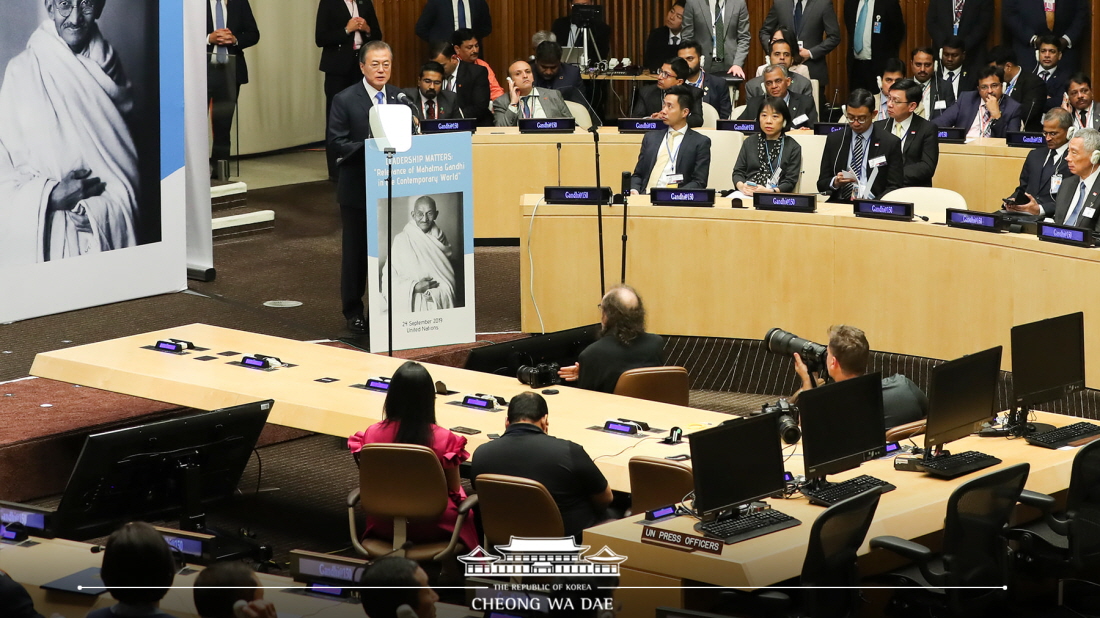이 웹사이트는 제19대 대통령 임기 종료에 따라 대통령기록관이 「대통령기록물 관리에 관한 법률」에 의해 이관받아 서비스하는 대통령기록물입니다. 자료의 열람만 가능하며 수정 · 추가 · 삭제는 불가능합니다.
다만, 「개인정보보호법」에 의하여 개인의 정보를 보호받기 원하시는 분은 관련 내용(요청자, 요청내용, 연락처, 글위치)을 대통령 웹기록물 담당자(044-211-2253)에게 요청해 주시면 신속히 검토하여 조치해 드리겠습니다. 감사합니다.
SPEECHES & REMARKS
BRIEFINGS
Remarks by President Moon Jae-in at Celebration of 150th Birth Anniversary of Mahatma Gandhi

Honorable Prime Minister Narendra Modi, who invited me to this precious event, and other distinguished heads of state and government, I am pleased to meet you all.
The United Nations was born out of the ravages of World War II for the sake of the independence of repressed nations and world peace. It is truly meaningful that an event to honor Mahatma Gandhi, the symbol of nonviolent resistance for freedom and peace, is being held at the United Nations.
One of Gandhi’s teachings embodies the United Nations’ spirit: “There is no path to peace. Peace is the path.” At the same time, it has become a compass for navigating toward peace on the Korean Peninsula. For Koreans who are ushering in an era of permanent peace, Gandhi is a great teacher who inspires us with wisdom and courage.
This year marks the 150th anniversary of the birth of Gandhi and also the centennial of Korea’s March First Independence Movement. Korea’s pro-independence manse demonstrations that started on March 1, 1919, were a massive struggle joined by some two million people, approximately 10 percent of the entire population back then.
Ordinary nameless people stood up to Japanese imperialists through the strength of nonviolence, and their spirit of the March First Independence Movement served as the foundation for a democratic republic.
A century ago, Koreans shared camaraderie-like bonds and hopes with Gandhi and other contemporary Indians. They blessed and respected the man who was leading his country through Satyagraha, nonviolent resistance. They also had extraordinary trust in and expectations for the Indian people who were marching step by step toward independence.
In February 1923, the Korean people came to know about Gandhi’s boycott of British goods through the press, and in the summer that year, Korea’s campaign to promote the use of domestic products reached its peak.
Gandhi criticized Japanese imperialists for imprisoning uncooperative Korean students and also sent a message to encourage the Korean people on January 5, 1927, expressing his hope that Joseon would come to wholly belong to Joseon through absolutely truthful and nonviolent means.
Newspapers in Korea published articles about Gandhi’s Salt March for 23 consecutive days in the spring of 1930. The Korean people deeply empathized with India’s nonviolence movement led by Gandhi, and they loved the poems of Rabindranath Tagore about how Korea’s March First Independence Movement had touched him and those of Sarojini Naidu which spoke of her sympathy.
Prime Minister Modi and distinguished heads of state and government,
India and Korea, both having suffered from colonial rule, were partners who gave inspiration to and courage for each other’s liberation. Now, India and Korea are advancing our special strategic partnership further based on the shared values of democracy and common prosperity.
The world is becoming a better place with the spirit of Gandhi. Nelson Mandela overcame Apartheid with the strength of inclusiveness and truth. Rosa Parks started the Montgomery bus boycott in 1955. Martin Luther King Jr. led the civil rights movement. Women in the Himalayan region started the Chipko Movement against logging companies in 1974 by hugging trees and singing. All of these who fought against violence with the power of nonviolence to protect themselves and their communities as well as nature and the dignity of life are the descendants of the Great Soul, Gandhi.
Guaranteeing the ordinary people’s right to determine their own destinies and that of their communities constitutes the very starting point of democracy.
Gandhi said that we have nothing without hope. We can be happy only when we cherish and nurture hope in daily lives.
I hope that today’s event to celebrate the 150th anniversary of Gandhi’s birth will greatly inspire us to ponder his spirit and move toward a world where everyone embraces each other.
I express my gratitude to Prime Minister Modi for his special consideration in inviting me to this event. Given the respect and love that Koreans have for Gandhi, I am confident that India-Korea relations will deepen further.
Thank you.



